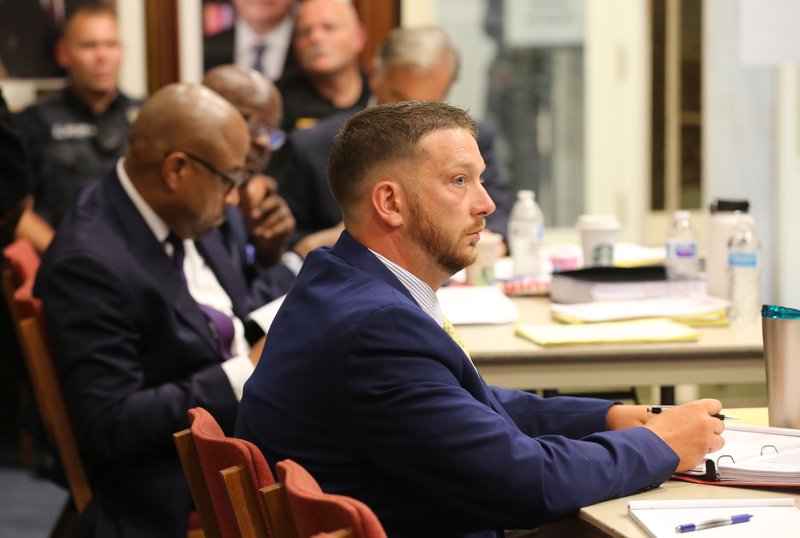Pulaski County Circuit Judge Tim Fox wrongly ignored evidence supporting the decision to fire Little Rock officer Charles Starks, attorneys for the city say in written arguments to the Arkansas Court of Appeals to overturn the judge's ruling that returned Starks to work.
The city's lawyers, Khayyam Eddings and Michael Moore with the Friday, Eldredge & Clark firm, filed the first briefs in the appeal of Fox's January ruling Tuesday, more than four months into the process of challenging the judge's decision to return Starks to the force at reduced pay.
After an internal investigation, Starks was fired by Police Chief Keith Humphrey in May 2019, 2½ months after Starks fatally shot Bradley Blackshire, a car-theft suspect, in a confrontation in west Little Rock.
All of Starks' supervisors recommended that he be cleared of wrongdoing, and Humphrey did not fault Starks' use of force.
But the chief found that Starks had broken an officer-safety order prohibiting police from deliberately getting in front of a moving car. Starks appealed his termination to circuit court.
Fox agreed with the chief that Starks had violated police procedure but ruled that firing was too severe. In reaching his conclusion that Starks should be reinstated, Fox noted that the officer's decision to use deadly force was never an issue in the decision to fire him.
The judge ordered that Starks be returned to the force, reducing the punishment to a 30-day unpaid suspension and pay cut. The judge also ordered the city to reimburse Starks $28,177 for his lost wages and benefits.
To overturn Fox's ruling to reinstate Starks, the appeals court will have to find that the judge acted against the preponderance of the evidence or that his decision was definitely a mistake. During the course of proceedings, Fox has noted that the standard of appellate review for these kinds of rulings is "the highest, most stringent standard."
The city's position is that the judge gave too much consideration to testimony by Starks' supervisors that he did not intentionally violate procedure but did not give enough weight to Starks' testimony that he had deliberately moved in front of Blackshire's car to get to cover.
Rather than disregard how Starks came to kill Blackshire, the judge should have considered that Starks deliberately and unnecessarily put himself in a situation that made the use of deadly force highly likely, the city lawyers state in their brief.
Fox wrote in his decision that he evaluated Starks' actions leading up to the officer's decision to shoot and found no fault with his actions once he got out of his squad car. But "a number of Starks' [previous] non-emergency decisions fall below the threshold of a reasonable certified law enforcement officer with five years' training and experience," the judge wrote.
Starks, 33, had been with the department about six years at the time.
Fox described two "illogical" decisions by Starks before he encountered Blackshire that resulted in Starks violating police procedure: parking his squad car in a manner that required him to cross in front of Blackshire's car to confront the driver, but not parking the squad car in a way that would have kept Blackshire from exiting the parking lot.
The judge addressed the serious consequences, particularly Blackshire's death, that resulted from Starks' decision to confront Blackshire. Beyond killing Blackshire, his passenger could have been killed or wounded, as could have anyone in the immediate area, the judge wrote. The officers racing to assist Starks could have been hurt or killed, he wrote. The death of one person is serious, Fox said, but the outcome of the confrontation could have been even worse.
Starks had been on patrol in February 2019 when he was dispatched to track down a stolen car that had been seen traveling near the McDonald's at West 12th Street and South Rodney Parham Road.
Blackshire, a felon awaiting trial on drug charges, pulled into a parking lot at 7305 Kanis Road. Starks parked his car and got out to order the father of five to exit the vehicle.
Starks first fired into the car four times after it moved forward and grazed him. Starks then stepped in front of the vehicle while trying to take shelter behind his patrol car. Blackshire's car rolled forward, striking Starks again, and he fired more shots.
The woman riding with Blackshire was unharmed. Police also found a stolen gun in the car.
Blackshire's family says he had borrowed the car about an hour before he was killed and had no idea it was stolen.
His family is suing Starks, backup officer Michael Simpson and the city in federal court, claiming state and federal civil rights violations that include excessive force and wrongful death. The suit also accuses the two officers of doing nothing to help Blackshire after he was shot and taking too long to call an ambulance.
Starks resigned from the department almost three weeks ago, complaining that Humphrey -- who ordered Starks' firing last year -- had made his return to work "intolerable" while refusing to acknowledge that he only used deadly force to protect himself. Starks' last day on the job was Saturday.
Starks had twice returned to court to complain that the department had been mistreating him since his reinstatement, leading to the judge threatening to hold the city, Humphrey and Mayor Frank Scott Jr. in contempt. Starks has since reported to the judge that the city stopped paying anything into his retirement, including the money withheld from his paycheck. Starks also is suing the chief and mayor over the decision to fire him.
The fallout from the Starks' case includes three state-court lawsuits against Humphrey from six officers, including two of the department's three assistant chiefs, who accuse the chief of retaliating against them due to either their involvement in the internal investigation of the Blackshire slaying or their association with officers involved in the investigation.
